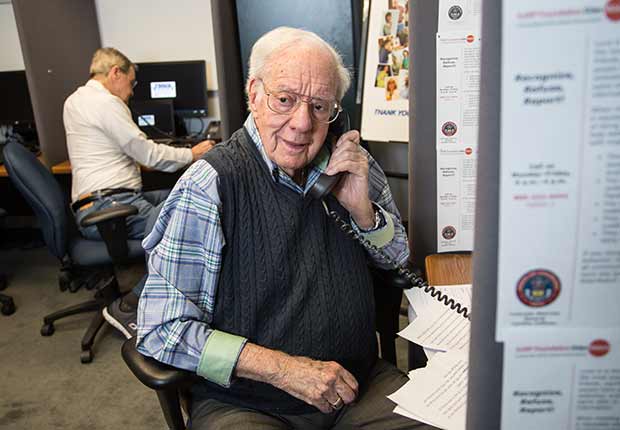AARP Hearing Center

By Rachel Brand
Sitting in a Denver call center, Joe Pells straps on a telemarketer’s headset and dials strangers from a marketing list. Most of the time, nobody answers. Often, Pells leaves a detailed message. When he gets through, people listen to him warily.
The 88-year-old retired insurance salesman explains to them that each year, thousands of victims lose millions of dollars as a result of investment fraud. Unregistered salespeople target older people through phone calls, emails and free lunch seminars. They drum up a false sense of urgency and promise sky-high financial returns.
Because 9 of 10 cases prosecuted against fraud involve unregistered brokers or securities, Pells warns people: “Deal only with registered salespeople. Vet it. Research it. Find out what you can about it, or hang up.”
Pells is one of about a dozen volunteers with the AARP Foundation Fraud Fighter Call Center in Denver—another dozen are in Seattle—a nine-year-old program supported since 2012 by a $200,000 yearly grant from the Financial Industry Regulatory Authority (FINRA) Investor Education Foundation.
Research shows that people who hear anti-fraud messages are one-third less likely to respond to an unethical pitch. In 2015, center volunteers completed 131,733 calls to potential victims nationwide. “I feel a great deal of satisfaction helping people, and they thank me,” Pells said.
Fraud prevention programs
The AARP Foundation regional office in Denver also operates the ElderWatch program, a consumer complaint resolution hotline at 800-222-4444.
The Colorado Attorney General’s Office gives AARP Foundation $300,000 a year so that about 150 volunteers can, among other duties, take complaints from older people who think they might be a victim of fraud. The foundation has found that older people are most often targeted for schemes involving prizes, sweepstakes, lotteries, home repair services or products, auto sales or repairs, or real estate and timeshare investments.
Some complaints are resolved by mediation; others are referred to police, prosecutors or securities investigators. In 14 years of operation, ElderWatch has handled 25,000 consumer complaints.
Two years ago, the AARP Foundation Colorado office started sharing its techniques and information with the AARP Fraud Watch Network program. This national initiative to combat fraud includes a toll-free consumer helpline (877-908-3360) and a robust website as well as tips and tools to help people avoid scams.
Financial fraudsters tend to target older, married, high-income, college-educated people.
“The older demographic is disproportionately targeted, in part because they have had a lifetime to accumulate wealth,” said Gerri Walsh, president of the FINRA Investor Education Foundation. “Yet they are also the most vulnerable population because if they are no longer working, they don’t have the opportunity to recover from losses.”
People who have recently lost a job, moved, been ill or experienced the death of a loved one are also at risk, said Amy Nofziger, AARP Foundation regional operations director. “We often hear, ‘I just got out of the hospital and the phone rang, and I wasn’t thinking clearly.’ ”
Nofziger urges people to practice a refusal script that works for them—such as “I never do business over the phone,” or “I need to check everything out with my son, who works for the police department”—and tape it to the phone or the back of their front door.
“Scammers will see that you are too much work, and they’ll give up on you,” Nofziger said.
Recently, Pells spoke with a woman who got an unsolicited call from a supposed computer technician who claimed that her computer had a virus and he needed her personal financial information to fix it.
Pells said that such unsolicited calls are invariably a scam. “Always hang up,” he added. “Don’t lead them on.”
Rachel Brand is a writer living in Denver, Colo.































































